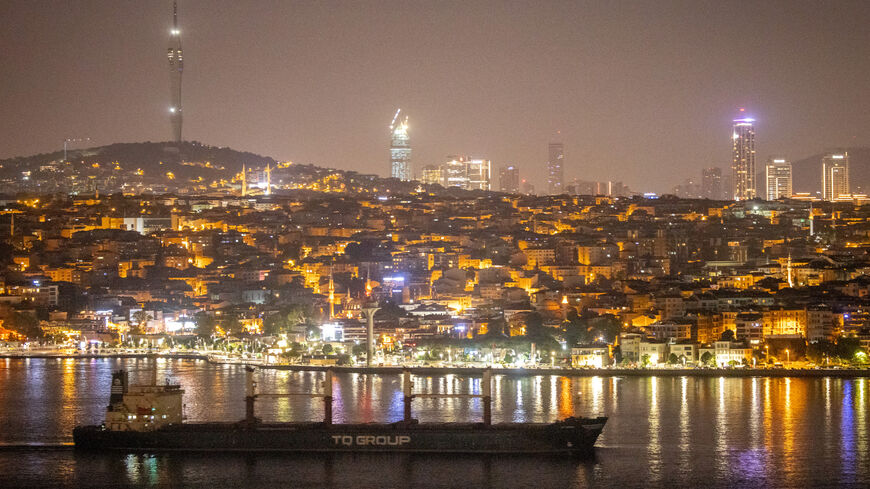The Kremlin showed no signs of returning to a critical Black Sea grain deal that allows Ukrainian grain to be exported to world markets, following a phone call Wednesday between Turkish President Recep Tayyip Erdogan and Russia’s Vladimir Putin.
Erdogan pledged, nonetheless, to continue “intense diplomatic efforts” to salvage the deal abandoned by Russia two weeks ago.
"President Erdogan expressed the importance of refraining from steps that could escalate tensions during the Russia-Ukraine war, emphasizing the significance of the Black Sea Grain Initiative, which he described as a bridge of peace," a brief statement from Turkey’s Communication Directorate said after the two leaders’ phone conversation.
President @RTErdogan spoke by phone with President Vladimir Putin of Russia.
— Presidency of the Republic of Türkiye (@trpresidency) August 2, 2023
The two leaders agreed on President Putin’s visit to Türkiye.
Thanking his counterpart for the two amphibious fire-fighting aircraft Russia has sent for Türkiye’s fight against wildfires, President…
Erdogan told Putin that a long period of “inactivity” regarding the deal would benefit no one. “[He] pointed out that grain prices, which decreased by 23% during the implementation period, have increased by 15% in the last two weeks,” the Turkish readout said, adding that low-income countries were affected the worst.
But a corresponding statement from Moscow reaffirmed Russia’s position that it would not return to the agreement unless sanctions against Russian fertilizer companies were lifted.
Russia said it was “taking into account the needs of the countries most in need of food” and was creating “reliable options for the supply of Russian grain, including on a free-of-charge basis.”
“This issue was discussed at the second Russia-Africa summit recently held in St. Petersburg,” it said, signaling a “willingness to cooperate in this area with Turkey and other interested countries.”
Kremlin Deputy Spokesman Dmitry Peskov made similar arguments Tuesday after Ambassador Linda Thomas-Greenfield, US Representative to the United Nations, claimed there were signs that Russia may be resurrecting the deal. "Russia — and President Putin has said this 100 times already — is ready to immediately return to the deal itself … just the deal must be implemented in the part that concerns the Russian Federation. So far this has not been done, as you know,” Peskov said.
"The West imposed sanctions against Russia without taking into account the needs of the world community for food; the UN General Secretariat is well aware of this," Peskov added.
Ankara’s endeavors
For the last two weeks, Ankara has been struggling to get Moscow back into the Black Sea Grain Initiative, which enables Ukraine, dubbed the world's breadbasket, to export its grain by sea despite a wartime blockade by Russia. Nearly 33 million tons of Ukrainian grain have been exported since the signing of the agreement last year at Istanbul’s Dolmabahce Palace, a 19th-century Ottoman palace overlooking the Bosporus, which connects the Black Sea to the Mediterranean Sea.
The 2022 deal brought much kudos to Erdogan for getting Russia and Ukraine to resume Kyiv’s grain exports through Black Sea ports and averting a global wheat crisis. While Erdogan failed in his ambitions to broker a peace deal between Kyiv and Moscow, he remained a crucial actor as sides negotiated the deal's extension in November, March and May. When Moscow extended the accord for another 60 days in May, it warned it would not renew the deal unless Russian demands were met. Moscow’s demands include reconnecting Russia’s agricultural bank to the SWIFT payment system, lifting restrictions on maritime insurance and the supply of spare parts used in agricultural machinery, and, most importantly, ending sanctions against Russian fertilizer companies.
In July, Turkish Foreign Minister Hakan Fidan held talks with his Russian counterpart, Sergey Lavrov, and UN Secretary-General Antonio Guterres to persuade Moscow to return to the table. The former spy chief turned foreign minister brushed away alternative solutions — such as Kyiv’s offers to ship Ukrainian grain via Romanian, Bulgarian and Turkish waters in the Black Sea — as "likely endangering security."
Erdogan, who delights in his reputation as one of the few global leaders with a direct line to Putin, wanted to achieve a breakthrough in a presidential phone call.
Unlike in the past, however, when telephone calls between the pair were frequent, it took a full week for the two leaders to find a mutually convenient slot.
Putin to visit Turkey?
The statement from the Turkish side said the two leaders had agreed that Putin would visit Turkey but provided no timeframe. The statement from the Russian side was more ambiguous, saying that the two leaders had decided to “continue contacts at various levels, including in the context of preparations for a possible meeting of the two leaders.”
Putin’s visit to Turkey has been on the agenda since May. Erdogan had invited Putin to one of the critical events of his presidential campaign on April 27 — the opening of Turkey’s first nuclear power plant, the biggest joint Turkish-Russian investment yet. But Putin kept dragging his feet, and Erdogan, who had a health scare on the campaign trail, attended the opening via video conference rather than open it alone.
“Erdogan had invited me, but we agreed that it would be better for me to go after the elections,” Putin said last week, ahead of his phone conversation with Erdogan.
Turkish and international pundits maintain that the bumpy bromance between Erdogan and Putin is under strain due to a number of factors, including Ankara’s struggle for balance in Russia's war on Ukraine and Erdogan’s recent efforts to cozy up with a West that both leaders often denounce for “greed” and “hypocrisy” — and often in almost identical wording.
“While Moscow reacted calmly to Ankara’s willingness to approve Sweden’s NATO accession, Turkey’s transfer of five Ukrainian commanders who had been captured by Russian forces back to Kyiv and Erdogan’s remarks in support of Ukraine’s entry into NATO sparked outrage in the Kremlin,” wrote Ruslan Suleymanov, a nonresident research fellow at the Institute for Development and Diplomacy at ADA University in Baku.
After Wednesday’s phone conversation, the statements on both sides were carefully worded to accentuate the positive, such as Turkey’s thanks to Russia for sending firefighting planes to help extinguish forest fires raging along the country’s southern coast and assist the ever-growing number of Russian tourists who holiday there.








